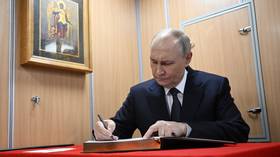Germany could slip into recession – study

Investor confidence in Germany has fallen for a third consecutive month as growth prospects worsen, fueling fears of a recession in the EU’s largest economy, Bloomberg reported on Tuesday.
The economic sentiment index measured by the ZEW economic research institute dropped to -10.7 in May from 4.1 in April, representing the first sub-zero reading this year. An index of current conditions also deteriorated, the outlet said.
The data comes amid a deeper-than-expected production slump across most industries in Germany. New orders for manufacturing companies dropped 10.7 % month-on-month in March, the sharpest decline since April 2020.
“The financial market experts anticipate a worsening of the already unfavorable economic situation in the next six months,” ZEW President Achim Wambach said in a statement. “As a result, the German economy could slip into a recession, albeit a mild one,” he added.
Economists are predicting that German industry will remain at a stand-still instead of the hoped-for recovery, dampening prospects of an economic resurgence.
“Today's ZEW sends a worrisome message,” Carsten Brzeski, global head of macro at ING, said in a report to clients. “Three consecutive drops are a new trend, a trend in the wrong direction.”
Tighter financial conditions and the shocks of soaring energy prices have begun to weigh on Berlin’s near-term growth, the International Monetary Fund (IMF) warned in its country report on Tuesday.
Germany’s GDP is expected “to stay near zero in 2023, before gradually strengthening to 1%-2% during 2024-26 as the lagged effects of monetary tightening gradually dissipate and the economy adjusts to the energy shock,” according to the IMF.
For more stories on economy & finance visit RT's business section














